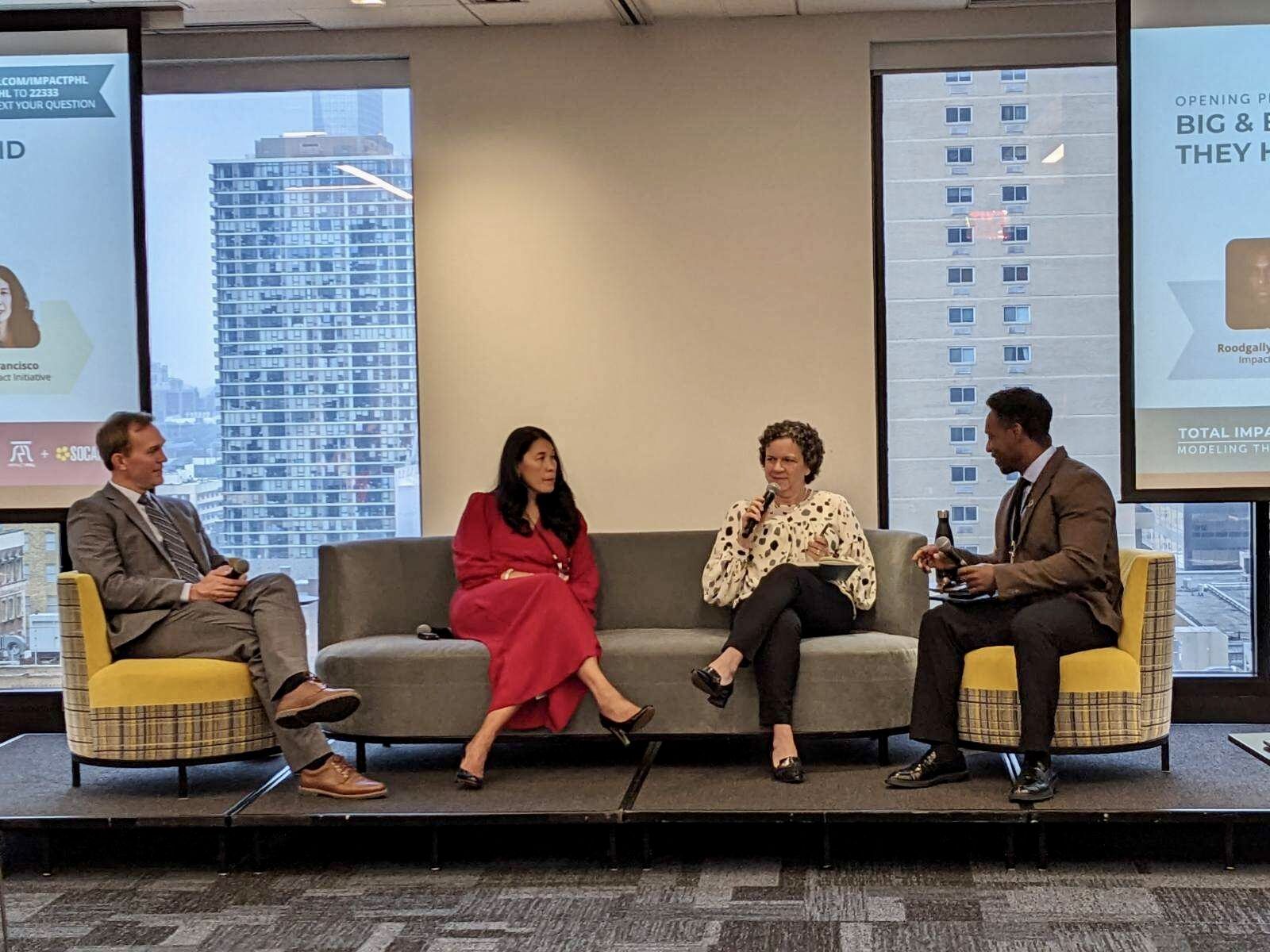Greetings, Agents of Impact!
Featured: ImpactAlpha Original
Feeling the heat: Overheard at the Global Impact Investing Network investor forum. More than 1,000 impact investors and other Agents of Impact filled up the vast Beurs Van Berlage in the center of Amsterdam on Wednesday for the Global Impact Investing Network’s investor forum. “In just 10 years we’ve built an industry,” declared the GIIN’s Amit Bouri. “But we need to move capital at a vastly different scale” to meet the many challenges we face. Channeling Swedish climate activist Greta Thunberg to challenge the audience, Triodos’ Marilou van Golstein Brouwers added, “The time for empty words is over.”
- Sense of urgency. Pressure is mounting on asset managers to get their capital on the right side of climate change and inclusion. “Students are protesting at our door every day,” said Liza Jonson of Swedbank Robur, one of Scandinavia’s largest asset managers. Jonson says Sweden’s insurance companies are also pushing the investor to move forward and faster on sustainability. Institutional requests for proposals now include ESG and impact reporting that “we have to defend,” said Vijay Advani, CEO of Nuveen. Advani said 100% of Nuveen’s $1 trillion in assets will be aligned with a responsible investment lens by the end of next year. (A Nuveen spokesperson clarified to ImpactAlpha that the commitment is to align 100% of assets with the UN PRI. Two-thirds of its portfolio, or about $650 billion, is already aligned).
- Mispriced risk. Convergence’s Christopher Clubb said data from the Global Emerging Markets (“GEMs”) risk database demonstrates that the risks of emerging markets business loans are much lower than perceived. The database, which pools data on credit default rates from customers funded by international finance institutions, should be made available to broader investing public, he added.
- Faith-based tension. Faith-based investors, including OIP Investment Trust ($550 million), the Church Pension Fund ($14 billion) and Skopos Impact Fund ($200 million) are pushing back on the notion that they are willing to take concessionary returns for their values-aligned investments. It’s more of a spectrum, said Candice Dial of Church Pension Fund. The best deals, added Skopos’ Luka Skorochod, are when operational metrics align with impact.
- Filling political voids. In the absence of political leverage, use economic leverage, said Refugee Investment Network’s John Kluge. Kluge called on impact investors to step up their financing of refugee solutions. RIN is building a “refugee investing index” with the Economist Intelligence Unit to help investors select markets to participate in.
- Share this post.
Dealflow: Follow the Money
French and Dutch banks invest in Neumann Group’s sustainable coffee initiative. Global “green” coffee giant Neumann Kaffee Gruppe is working to boost the incomes and resilience of smallholder farmers in its supply chain. It launched NKG BLOOM in 2017 to connect coffee growers in Uganda with farming inputs, financing and training. French bank BNP Paribas and Dutch banks ABN Amro and Rabobank are helping Neumann expand the initiative to 100,000 farmers in 10 countries with a $25 million loan. The “Smallholder Livelihoods Facility” includes risk sharing to protect the partner banks if farmers default on loans and credit issued through NKG BLOOM. (USAID and the Dutch Sustainable Trade Initiative provided guarantees to minimize the banks’ risk.) The loan facility represents “a solution that helps entire communities currently at risk of poverty,” said BNP Paribas’ Yannick Jung. Dig in.
Sympower secures $3.3 million to reduce fossil fuels in the electricity grid. When power needs fluctuate, most electricity grids meet demand spikes with fossil fuel-based power. Amsterdam-based software company Sympower minimizes that dirty energy use by helping businesses balance their energy needs. Its customers use Sympower’s platform to save money by moderating the energy use of the machinery and systems— from air conditioners to industrial smelters—in real time. Dutch impact investors Social Impact Ventures and PDENH have backed the company’s €3 million ($3.3 million) funding round. “We need all hands on deck for a clean energy future, with smart grid innovators fulfilling a crucial role in accelerating the energy transition,” said Social Impact Ventures’ Helmer Schukken. Read on.
Textile recycling venture Evrnu raises $9.1 million. Global clothing production has doubled in the past 15 years as consumers have embraced low-cost “fast fashion.” More than half of garments are tossed out within a year. Seattle-based Evernu is tackling waste and lost value with recycling technology for discarded garments. The company says its NuCycl process allows fashion and textile companies to disassemble materials to create new garments without compromising strength or quality. Evrnu’s goal is to help the fashion industry grow while “decoupling that growth from resource extraction of virgin materials.” Radicle Impact led the company’s $9.1 million Series A, which will help Evernu commercialize NuCycl and license the technology within two years. Levi’s, Adidas and Stella McCartney are working with Evrnu to develop customized fibers and fabrics. Check it out.
Rockefeller Foundation launches $100 million data-driven healthcare initiative. The foundation’s Precision Public Health initiative aims to get simple data analytics tools into the hands of frontline health workers in 10 countries, starting in India and Uganda. Its first project will focus on reducing maternal and child mortality with UNICEF.
Signals: Ahead of the Curve
New U.S. Development Finance Corp. is all dressed up with nowhere to go. The successor to the Overseas Private Investment Corp. was set to begin operations Oct 1. But most of the new capacities of the DFC, as it will be called, are on hold pending the passage of a federal budget. Temporary funding passed by Congress finances only existing programs. “Right now we continue to operate as OPIC,” David Bohigian, OPIC’s acting CEO, said at the GIIN’s investor forum in Amsterdam.
- Holding pattern. Paused for the moment is the new DFC’s authority to make equity investments in addition to the debt deals OPIC has done (see, “New U.S. development finance agency expands toolkit for female fund managers”). Technical assistance and grants also are on hold.
- New lead. The U.S. Senate last month confirmed Adam Boehler to lead the DFC. Most recently an advisor to the Health and Human Services department, Boehler was earlier CEO of Landmark Health, a provider of home health care for the chronically ill. He is reportedly close to White House advisor Jared Kushner, who was once a college roommate.
- Impact first. Bohigian, who plans to stay on for a transition period, says he has been working to institutionalize social impact in the new DFC. “When a deal goes to the investment committee,” Bohigian said, “the first thing should be the impact, not the credit report.”
- Share this post.
Agents of Impact: Follow the Talent
KKR appoints Stanislas de Joussineau to lead KKR’s Global Impact team in Europe, while Sharon Yang joins KKR Global Impact as a senior investor in Asia… COCAP, BALLE and Impact Hub Oakland will host “Nourishing Community Wealth” on Oct. 20 ahead of the bigger SOCAP gathering.
Thank you for reading.
– Oct. 3, 2019











